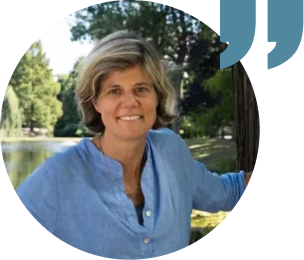Inge, in your previous assignment as COVID crisis manager for the Brussels Region, you were often confronted with the suffering behind the hard figures. How did you deal with that?
I completely agree that there was a lot of suffering behind the daily COVID figures. On the other hand, we must also put those figures in perspective. The big social question during the COVID crisis was at what cost did we want to protect the most vulnerable, i.e. largely the elderly population?
And you could also ask to what extent it was still relevant that the media reported the COVID figures every day, while there were undoubtedly also other more socially relevant news items that we don't report on. You could also clearly see that after a certain period of time, there was a clear COVID fatigue and the information about the crisis was no longer being picked up by a large part of the population. An information fatigue that you now also see with the Ukraine crisis.
What I have also learned is that "the death of one person" is not always a tragedy. I have worked in Africa and in some cultures a death is a celebration rather than a tragedy. During our vaccination campaign in Brussels, we also encountered this in certain communities in Brussels. In some communities, the virus was just part of fate and you cannot go against fate.
The covid crisis was extremely mediatised with lots of stories. How do you feel about the fact that you can convince people more with stories than with numbers?
We have certainly tried some forms of storytelling, such as a commemoration of the deaths of the first wave in August 2020. But as long as people did not have to deal with a death in their own circle, the impact remained small.
What I did see was the importance of credibility in communication. Scientists and policy-makers were faced with progressive insight, which meant they had to change the measures a few times. In the eyes of some groups of the population, they lost their credibility as a result. On the other hand, there were the anti-vaxers who, often religiously, delivered the same message over and over again throughout the entire period, for example that the vaccine would cause fertility problems.
The covid crisis was undoubtedly a very intense period for you. Where did you get your energy from? How did you boost yourself every day?
You are working on an issue that has a huge impact on everyone and you are trying to limit the impact in the best possible way and return to normal in the fastest possible way. In the first phase, the focus was on limiting the impact on hospitals and the population, and in the second phase we made a lot of efforts to achieve the broadest possible impact of the vaccination campaign. I still clearly remember the first vaccination in a residential care centre that we carried out against an almost impossible deadline... moments like that give you an enormous energy boost... The whole team pushed themselves forward, on adrenaline and with a higher goal in mind.
Which quote would you like to see analysed by DrQuote in the future?
I would like to see "The moment seemed endless, but it was probably only half that" by Steve Toltz. I attach great importance to the concept of relativity. Everything depends on which perspective you look at it from. That concept has certainly helped me during the whole corona period. As I said earlier, some communities attached a totally different importance to mortality than we do. And everyone in the media and social media had an opinion about COVID... It often comes down to the fact that everything is perception and subjective, and trying to paint a different picture or offer a different perspective is always helpful for everyone.

